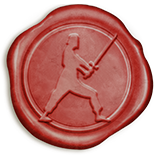
Combat is split into rounds and turns. A round represents about 6 seconds in the game world. During a round, each participant in a battle takes a turn. On a player's turn, they can move a distance (up to the creature's walking speed) and take one action (as described in the table below). In addition, some classes and abilities allow for one Bonus Action (also described below). Some characters can also take a single reaction per round, which can be triggered outside of a players turn.
The table below outlines what a character can do on their turn (or during the round). Various Class features, spells, and other abilities may grant more than one action and are not included in the table below (for example, the haste spell).
| Movement | |
|---|---|
| Walk | : Full movement |
| Climb, Crawl | : Every foot of Movement crawling or climbing costs 1 extra foot. |
| Difficult Terrain | : Every foot of Movement in Difficult Terrain costs 1 extra foot. |
| Squeeze Through Small Spaces | : Every foot of Movement through small spaces costs 1 extra foot; disadvantage on Attack rolls and Dex Saving Throws while moving through the small space |
| Stand up (from prone) | : 1/2 movement (if movement is 30ft, standing up uses 15ft of movement) |
| Interact with One Item (1 per round) | |
| Draw or sheath a weapon | |
| Hand an item to another player | |
| Load a crossbow | |
| Retrieve or stow an item from your pack | |
| Pickup an unattended item | |
| Drop an unattended item | |
| Move an object | |
| Open a chest | |
| Open or close a door | |
| Turn a key in a lock | |
| Throw a lever or switch | |
| Fish a few coins from a belt pouch | |
| Remove a ring | |
| Drink all the ale in a flagon | |
| Extinguish a small flame | |
| Don a mask or hood | |
| Press an ear against a door | |
| Kick a small stone | |
| Combat Actions (default: 1 per round) | |
| Attack | : Make a melee or ranged attack |
| Cast a Spell | : With 1 action of casting |
| Dash | : Double movement |
| Disengage | : Moving does not provoke attacks of opportunity |
| Dodge | : Adv on Dex Saves, Attacks against you have Disadvantage |
| Escape Grapple | : Make an Athletic / Acrobatics check (your choice) against the grappler's Athletics |
| Grapple | : Target of your grapple must be no more than 1 size category larger, and it must be within reach. Make a Strength (Athletics) check contested by target's Athletic / Acrobatics (whatever they choose) |
| Help | : Your target gains advantage on the next ability check they make before the start of your next turn |
| Hide | : Make a Dex (Stealth) to become hidden |
| Improvise | : Take an action not described here (break down door, intimidate foes) |
| Ready/Hold Action | : Ready an action for use later during the round. Decide what circumstances might trigger your action. When the trigger occurs you may choose to spend your reaction after the trigger finishes to perform the readied action or move a distance up to your speed (if you readied Dash). If you ready a spell, it requires concentration until it is triggered. |
| Search | : Depending on the nature of the check, make a Perception (Investigation) check |
| Stabilize | : Use a healer's hit to stabilize a dying creature (no check required). Or, without a kit, make a DC 10 Wisdom (Medicine) check to stabilize. |
| Use an Object | : Activate an item |
| Bonus Actions (1 per round) | |
| Two-weapon fighting | : When you attack while using 2 light melee weapons, you can use a bonus action to attack with offhand. |
| Bonus Action Spells | : Some spells can be cast as a bonus action, as described in a spell's casting time. Some popular bonus action spells include: Healing Word, Hex, Hunter's Mark, Misty Step, Shield of Faith |
| Rogue: Cunning Action | : Starting at Level 2, a rogue can use their bonus action to Dash, Disengage, or Hide. |
| Reaction (1 per round) | |
| Opportunity attack | : Provoked when a hostile creature moves out of your reach (resolved before movement). |
| Trigger a Ready/Held Action | : A reaction can be used to perform a held action (see above, under combat actions). |
| Reactionary Spells | : Some spells can be cast as a reaction, as described in a spell's casting time. Some popular reactionary spells include: Absorb Elements, Counterspell, Hellish Rebuke, Shield |